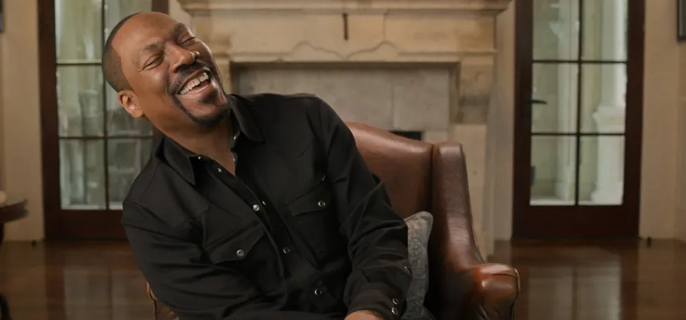In the '80s and '90s, few movie titans commanded the same level of adoration as Arnold Schwarzenegger, Sylvester Stallone, and Eddie Murphy. The mere mention of their names on a marquee was a guarantee of excitement, even if it wasn't always a guarantee of quality. We showed up, most times, even if it was for films like Sorry, Last Action Hero, Rhinestone, or Vampire in Brooklyn. It was a pre-social-media age, when we could love a movie star for their aura without feeling like they were our best friend and we'd enjoy hanging out with them over a pizza.

In recent years, Netflix has worked hard to correct the perceived aloofness of being a mega-celebrity, allowing these icons to descend, if only temporarily, from their pedestals. Documentaries like Arnold, Sly, and the streamer's latest, Being Eddie, have put viewers on a first-name basis from the start, delivering amiable familiarity, indelible anecdotes, and a steady stream of real estate porn to convince us that, provided we avoid or at least soften certain questionable projects and personal decisions, people like Schwarzenegger, Stallone, and Murphy are just like us. Only with far, far nicer homes.
Being Eddie isn't a great piece of documentary filmmaking nor does it possess an iota of journalism in its DNA. What it is, though, is consummately polished and affectionate. It takes an actor who rarely seemed vulnerable or especially comfortable in the spotlight at the peak of his stardom and makes him seem, for 103 minutes, thoroughly at ease.
Directed by Oscar-winning editor Angus Wall (who will always have a place in my heart as one of the creative forces behind the opening credit sequence for Apple's Pachinko), Being Eddie smooths over any bumpy patches to deliver a clean arc to Murphy's life - from Richard Pryor-loving kid to precocious SNL breakout to boundary-breaking movie star to family movie guru to beloved elder statesman, family man, and trailblazer. It's an arc celebrated and illustrated by talking heads ranging from Dave Chappelle, Jerry Seinfeld, and John Landis to Jerry Bruckheimer, Jeffrey Katzenberg, and Elvis Mitchell.
It wasn't a life without adversity, but all you can hope for from this documentary is gentle, smiling acknowledgment of a few moments when Murphy's career went off-track. He chuckles about Vampire in Brooklyn, admits that the timing of Norbit hindered his Oscar hopes for Dreamgirls, and recommends to young actors that while it's important to play a variety of roles, one should never play a rocket ship (a reference to the otherwise unnamed Meet Dave). He observes that for a handful of years, he stopped acting entirely because of the quality of stuff he was making but doesn't single out Mr. Church or A Thousand Words as a nadir. There isn't a hint of deep introspection about professional failures or missteps - just a wry amusement that in a multi-decade career, mistakes will be made.
Murphy's falling out with Saturday Night Live is given slightly less varnished treatment; he admits to the betrayal he felt at David Spade's notorious "falling star" joke but is careful to place the blame on the show's creative process and not on Spade. Murphy's return to SNL for a 2019 hosting stint becomes the documentary's pivotal sequence with a number of cast members talking about having him back in the fold and great behind-the-scenes footage of Murphy, Tracy Morgan, Chris Rock, and Chappelle just shooting the shit backstage. It's odd how much a documentary released in 2025 pivots around this 2019 moment but I guess the time gap gave the production opportunities to film Eddie and his happy family at his impressively over-the-top home with a bowling alley and an atrium with a retractable roof.

